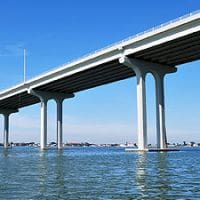The Problem
Congestion is growing on America’s roadways, harming the nation’s economy and citizens’ way of life. With nearly a dozen cities on track toward Los Angeles levels of congestion by 2030 and the often-beleaguered Highway Trust Fund continuing to run low on funds, outcomes such as greater pollution, increased accidents, and wasted time will become the norm for too many Americans. Tolling the nation’s roadways would begin to lessen the number of drivers on the road and help to fund necessary infrastructure investments, but such arrangements are often politically unpopular.
The Proposal
Tolling the nation’s most-congested roadways would encourage their more-efficient use and begin to chip away at the number of drivers on the road. To encourage such arrangements, the federal government could (1) incentivize the construction of highways that utilize congested tolling by lowering the matching rate available for projects on highways that do not use congestion pricing (2) offer federal guidance to states and localities on the creation of a Progressive Refundable Mobility Tax (PRMT) credit to compensate low-income households for the increased costs of congestion pricing and, finally, (3) allow state and local governments to determine the allocation of toll revenues between a PRMT and infrastructure investment.
Abstract
A large and growing burden on the nation’s economy, traffic congestion arises for various reasons, and more than one mechanism is needed to combat it. It is most unlikely, however, that serious inroads to address the problem will be made without fundamental reform in the way consumers are charged for their use of congested highways. Congestion prices are tolls that reflect the economic costs of congestion, including productivity losses from traffic delays, increased accidents, higher emissions, and more. Congestion prices would help reduce these economic costs and guide transportation investment resources to their highest and best use, which would include a better balance between highway and transit investment. In addition, such prices would generate revenues to help finance new investment and compensate low-income people and others for whom toll payments are especially burdensome. Requiring federal, state, and local engagement, such reform is a necessary step in the development of an effective, efficient, and sustainable highway system for the 21st Century.



